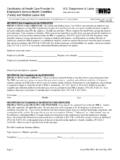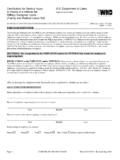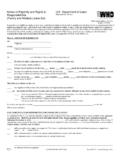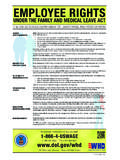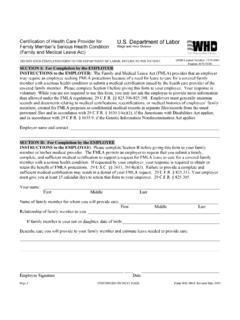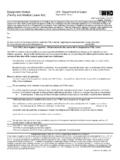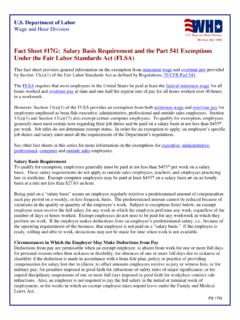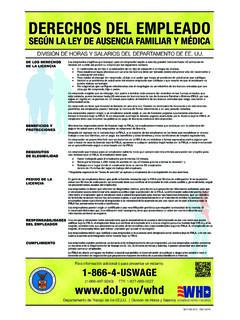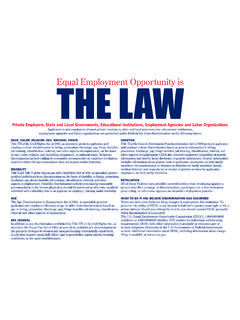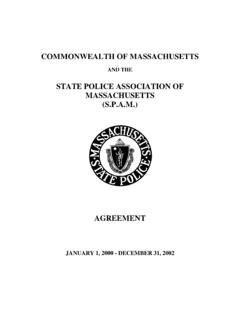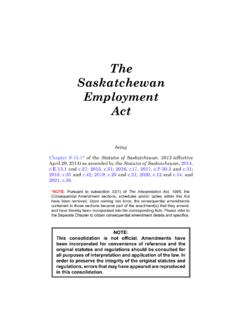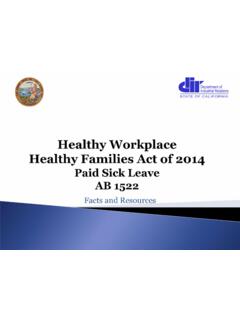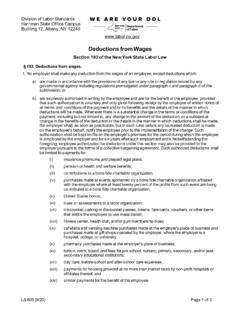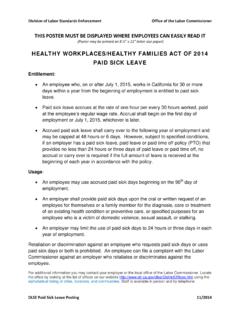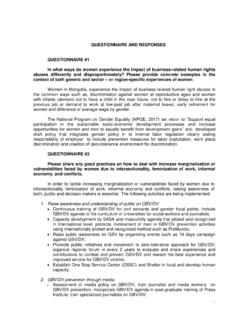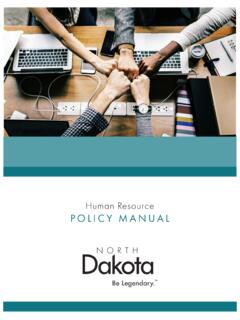Transcription of Fact Sheet #17G: Salary Basis Requirement and the ... - DOL
1 *Note: The Department of Labor revised the regulations located at 29 part 541 with an effective date of January 1, 2020. WHD will continue to enforce the 2004 part 541 regulations through December 31, 2019, including the$455 per week standard Salary level and $100,000 annual compensation level for Highly Compensated Employees. The final rule is available at: Department of Labor wage and Hour division (Revised September 2019) Fact Sheet #17G: Salary Basis Requirement and the Part 541 Exemptions Unde r the Fair Labor standards Act (FLSA)T his fact Sheet provides information on the Salary Basis Requirement for the exemption from minimum wage and overtime pay provided by Section 13(a)(1) of the FLSA as defined by Re gula t ions , 29 Part 541.
2 The FLSA requires that most employees in the United States be paid at least the f e de ra l m inim um wage for all hours worked and overtime pay at not less than time and one-half the regular rate of pay for all hours worked over 40 hours in a workweek. However, Section 13(a)(1) of the FLSA provides an exemption from both minimum wage and overtime pay for employees employed as bona fide executive, administrative, professional and outside sales employees. Section 13(a)(1) and Section 13(a)(17) also exempt certain computer employees. These exemptions are often called the white-c olla r or EAP exemptions. T o qua lif y f or exemption, employees generally must meet certain tests regarding their job duties and be paid on a Salary Basis at not less than $684* per week.
3 Job titles do not determine exempt status. In order for an exemption to apply, an employee s specific job duties and Salary must meet all the requirements of the Department s regulations. See other fact sheets in this series for more information on the exemptions for executive, a dm inis t ra t iv e, professional, computer and out s ide s a le s employees. Salary Basis Requirement To qualify for exemption, employees generally must be paid at not less than $684* per week on a Salary Basis . These Salary requirements do not apply to outside sales employees, teachers, and e m ploy e e s pra c t ic ing la w or m e dic ine.
4 Exempt computer employees may be paid at least $684* on a Salary Basis or on an hourly Basis at a rate not less than $ an hour. Being paid on a Salary Basis means an employee regularly receives a predetermined amount of compensation each pay period on a weekly, or less frequent, Basis . The predetermined amount cannot be reduced because of variations in the quality or quantity of the employee s work. Subject to exceptions listed below, an exempt employee must receive the full Salary for any week in which the employee performs any work, regardless of the number of days or hours worked. Exempt employees do not need to be paid for any workweek in which they perform no work.
5 If the employer makes deductions from an employee s predetermined Salary , , because of the operating 2 requirements of the business, that employee is not paid on a Salary Basis . If the employee is re a dy , willin g a nd a ble t o work, de duc t ions m a y not be m a de f or t im e whe n work is not a v a ila ble . Employers may use nondiscretionary bonuses and inc e nt iv e pa y m e nt s ( inc ludin g c om m is s ions ) paid on an annual or more frequent Basis , to satisfy up to 10 percent of the standard Salary level. A ddit iona lly , if a f t e r t he 52-week period, t he e m ploy e r ha s not m e t it s f ina nc ia l obliga t io n, the employer can make a final catch-up payment within one pay period after the end of the 52-week period to bring an employee s compensation up to the required level.
6 Any such catch-up payment will count only toward the prior year s Salary amount and not toward the Salary amount in the year in whic h it is pa id. Circumstances in Which the Employer May Make Deductions from Pay Deductions from pay are permissible when an exempt employee: is absent from work for one or more full days for personal reasons other than sickness or dis a bilit y ; f or a bs e nc e s of one or m ore f ull da y s due t o s ic kne s s or dis a bilit y if t he de duc t ion is m a de in a c c orda nc e wit h a bona f ide pla n, polic y or practice of providing compensation for Salary lost due to illness; to offset amounts employees receive a s jury or wit ne s s f e e s , or f or m ilit a ry pa y.
7 F or pe na lt ie s im pos e d in good f a it h f or inf ra c t ions of s a f e t y rule s of m a jor s ignif ic a nc e ; or f or unpa id dis c iplina ry s us pe ns ions of one or m ore f ull da y s im pos e d in good f a it h f or workpla c e c onduc t rule inf ra ct ions . A ls o, a n e m ploy e r is not re quire d t o pa y t he f ull s a la ry in t he init ia l or t e rm ina l we e k of e m ploy m e nt , or f or we e ks in whic h a n e x e m pt employee takes unpaid leave under the Family and Medical Leave Act. Effect of Improper Deductions from Salary The e m ploy e r will los e t he e x e m pt ion if it ha s a n a c t ua l pra c t ic e of m a king im prope r de duc t ions from Salary .
8 Factors to consider when determining whether an employer has an actual practice of m a king im prope r de duc t ions inc lude , but a re not lim it e d t o: the number of improper deductions, particularly as compared to the number of employee infractions warranting deductions; the time period during which the employer made improper deductions; the number and geographic location of both the employees whose Salary was improperly reduced and the managers responsible; and whe t he r t he e m ploy e r ha s a c le a rly c om m unic a t e d polic y pe rm it t ing or prohibit ing im prope r deductions.
9 If an actual practice is found, the exemption is lost during the time period of the deductions for employees in the same job classification working for the same managers responsible for the improper deductions. I s ola t e d or ina dv e rt e nt im prope r de duc t ions will not re s ult in los s of t he e x e m pt ion if t he e m ploy e r reimburses the employee for the improper deductions. Safe Harbor I f a n e m ploy e r ( 1) ha s a c le a rly c om m unic a t e d polic y prohibit ing im prope r de duc t ions a nd inc luding a complaint mechanism, (2) reimburses employees for any improper deductions, and (3) makes a good f a it h c om m it m e nt t o c om ply in the future, the employer will not lose the exemption for any e m ploy e e s unle s s t he e m ploy e r willf u l ly v iola t e s t he polic y by c ont inuing t he im prope r de duc t ions after receiving employee complaints.
10 3 Fee Basis A dm inis t ra t iv e , prof e s s iona l a nd c om put e r e m ployees may be paid on a fee Basis rather than on a Salary Basis . If the employee is paid an agreed sum for a single job, regardless of the time required for its completion, the employee will be considered to be paid on a fee Basis . A fee payment is generally paid for a unique job, rather than for a series of jobs repeated a number of times and for which identical payments repeatedly are made. To determine whether the fee payment meets the minimum Salary level Requirement , the test is to consider the time worked on the job and determine whether the payment is at a rate that would amount to at least $684* per week if the employee worked 40 hours.
